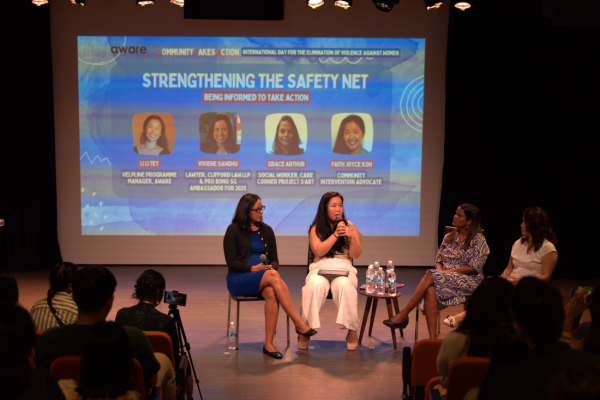-
Advocacy Theme
-
Tags
- Abortion
- Adoption
- Caregiving
- CEDAW
- Disability
- Domestic Violence
- Domestic Workers
- Harassment
- Healthcare
- Housing
- International/Regional Work
- Maintenance
- Media
- Migrant Spouses
- Migrant Workers
- Muslim Law
- National budget
- Parental Leave
- Parenthood
- Polygamy
- Population
- Race and religion
- Sexual Violence
- Sexuality Education
- Single Parents
- Social Support
- Sterilisation
- Women's Charter
What it takes to stop domestic violence: Insights from IDEVAW 2024 (2/4)
December 17th, 2024 | Children and Young People, Events, Gender-based Violence, News
By Athiyah Azeem. Lydia Ariani contributed to this article.
Faith Joyce Koh is a survivor of domestic violence. Her stepfather was a drunk, gambling womaniser who manipulated her, controlled her, and physically abused her. When she was 8 years old, he caned her so severely that her school reported it to the police.
Yet nothing came of it. Faith’s family members kept telling her to plead with thenot talk about the abuse to the police to not send her stepfather to prison, so she didn’t, and the police dropped the case. Her school counsellor got frustrated when Faith wouldn’t talk, so he stopped seeing her. Amid the pressure, Faith felt like it was somehow her fault that her stepfather caned her. She felt like she deserved it.

Insights at a glance:
- Faith Joyce Koh, a survivor of domestic violence, shared how she felt the police and her school failed to stop her stepfather from physically abusing her
- In Faith’s case, the system placed the responsibility on her when she was 8-years-old to progress the case
- There are now resources like the Domestic Violence Emergency Response Team (DVERT), a group of social workers who can issue emergency orders to perpetrators, which can include asking them to leave the household
- Social workers like Grace Arthur from Care Corner Project StART provide long-term case management to survivors
- Survivors can also file for Personal Protection Orders (PPOs), or file under the Protection from Harassment Act (POHA)
Faith told her story on a panel at IDEVAW 2024—a full-day event on 30 November 2024 by AWARE where advocates and experts convened to talk about gender-based violence.
“In my experience, everything and everyone failed me as a child,” Faith said to the audience. “My safety, my happiness and my joy were really deprioritised in everything.”
“It is very disheartening what has happened [in Faith’s case],” said Grace Arthur, a social worker for Care Corner Project StART. “Our hope is that such cases are not repeated.”
In Faith’s case, the system placed the responsibility of progressing the case on the survivor, who was only a primary school student then. There are now processes available to survivors where social workers can intervene.
Since April 2023, when police receive a report about family violence and ascertain that there are immediate safety concerns, they will activate the Domestic Violence Emergency Response Team, or DVERT, according to the Ministry of Social and Family Development or MSF.
The DVERT team, made of MSF social workers, can issue an emergency order to the perpetrator, which could involve asking them to not come near the survivor or temporarily leaving the household. They could place survivors in crisis shelters. Ultimately, they can refer the survivor to social service agencies like Care Corner, who can provide long-term case management.
Domestic violence is a multifaceted issue, Grace said. To address this, she said Care Corner social workers work with neighbours and friends to establish a safety plan. They also use a Continuum of Care structure, where they will provide care to their clients as they move through different stages of life.
Ultimately, when survivors feel conditioned to not have a voice, Faith said bystanders play an important role in taking action.
Li Li Tey, the moderator of the panel and AWARE’s Helpline Programme Manager, added that bystanders can call the National Anti-Violence and Sexual Harassment Helpline at 1800-777-0000 to report the incident. All callers’ identification is kept strictly confidential.
“The assurance is that, as a bystander, even if your report turns out to be a false alarm, you will not be liable,” Li Li said.
Viviene Sandhu, a lawyer at Clifford Law LLP and Pro Bono SG Ambassador of 2025, said there are now more resources available for survivors than before—and they are online. Since 2014, survivors are able to file for protection from harassment, unlawful stalking and false statements of fact under the Protection from Harassment Act or POHA.
Viviene also said survivors can file for Personal Protection Orders, which is a court order that tells the offender not to use violence against a family member. You can learn more about PPOs on our website.
“I always say: it takes a village,” Viviene said. She said survivors must first identify that they are being abused, then tell the people they trust about it. She encouraged people close to survivors to help them take steps toward filing for protection. Part of the process involves writing brief descriptions of the incident and the injuries the survivor sustained.
Grace said Care Corner Project StART helps survivors apply for PPOs, and provides counselling support.
The panel makes it clear that the onus for reporting domestic violence is often on the survivors. They need to advocate for themselves and document the abuses that happened to them to file for legal protection. Survivors can be retraumatised in the process. Documenting abuse can be even more difficult when the abuse they endured is not obvious to the human eye, like emotional and psychological abuse, and coercive control.
The conversations social workers, authorities and advocates may need to have going forward, is how we can make it easier and less traumatic for survivors to report domestic violence, get to a safe space, and to be believed.



